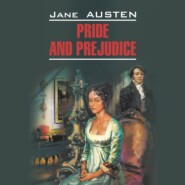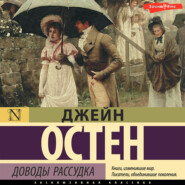По всем вопросам обращайтесь на: info@litportal.ru
(©) 2003-2025.
✖
Lady Susan
Настройки чтения
Размер шрифта
Высота строк
Поля
Let me congratulate you, my dearest Mother! The affair which has given us so much anxiety is drawing to a happy conclusion. Our prospect is most delightful, and since matters have now taken so favourable a turn, I am quite sorry that I ever imparted my apprehensions to you; for the pleasure of learning that the danger is over is perhaps dearly purchased by all that you have previously suffered. I am so much agitated by delight that I can scarcely hold a pen; but am determined to send you a few short lines by James, that you may have some explanation of what must so greatly astonish you, as that Reginald should be returning to Parklands. I was sitting about half an hour ago with Sir James in the breakfast parlour, when my brother called me out of the room. I instantly saw that something was the matter; his complexion was raised, and he spoke with great emotion; you know his eager manner, my dear mother, when his mind is interested. "Catherine," said he, "I am going home to-day; I am sorry to leave you, but I must go: it is a great while since I have seen my father and mother. I am going to send James forward with my hunters immediately; if you have any letter, therefore, he can take it. I shall not be at home myself till Wednesday or Thursday, as I shall go through London, where I have business; but before I leave you," he continued, speaking in a lower tone, and with still greater energy, "I must warn you of one thing – do not let Frederica Vernon be made unhappy by that Martin. He wants to marry her; her mother promotes the match, but she cannot endure the idea of it. Be assured that I speak from the fullest conviction of the truth of what I say; I know that Frederica is made wretched by Sir James's continuing here. She is a sweet girl, and deserves a better fate. Send him away immediately; he is only a fool: but what her mother can mean, Heaven only knows! Good bye," he added, shaking my hand with earnestness; "I do not know when you will see me again; but remember what I tell you of Frederica; you MUST make it your business to see justice done her. She is an amiable girl, and has a very superior mind to what we have given her credit for." He then left me, and ran upstairs. I would not try to stop him, for I know what his feelings must be. The nature of mine, as I listened to him, I need not attempt to describe; for a minute or two I remained in the same spot, overpowered by wonder of a most agreeable sort indeed; yet it required some consideration to be tranquilly happy. In about ten minutes after my return to the parlour Lady Susan entered the room. I concluded, of course, that she and Reginald had been quarrelling; and looked with anxious curiosity for a confirmation of my belief in her face. Mistress of deceit, however, she appeared perfectly unconcerned, and after chatting on indifferent subjects for a short time, said to me, "I find from Wilson that we are going to lose Mr. De Courcy – is it true that he leaves Churchhill this morning?" I replied that it was. "He told us nothing of all this last night," said she, laughing, "or even this morning at breakfast; but perhaps he did not know it himself. Young men are often hasty in their resolutions, and not more sudden in forming than unsteady in keeping them. I should not be surprised if he were to change his mind at last, and not go." She soon afterwards left the room. I trust, however, my dear mother, that we have no reason to fear an alteration of his present plan; things have gone too far. They must have quarrelled, and about Frederica, too. Her calmness astonishes me. What delight will be yours in seeing him again; in seeing him still worthy your esteem, still capable of forming your happiness! When I next write I shall be able to tell you that Sir James is gone, Lady Susan vanquished, and Frederica at peace. We have much to do, but it shall be done. I am all impatience to hear how this astonishing change was effected. I finish as I began, with the warmest congratulations.
Yours ever, &c.,
CATH. VERNON.
XXIV
FROM THE SAME TO THE SAME
Churchhill.
Little did I imagine, my dear Mother, when I sent off my last letter, that the delightful perturbation of spirits I was then in would undergo so speedy, so melancholy a reverse. I never can sufficiently regret that I wrote to you at all. Yet who could have foreseen what has happened? My dear mother, every hope which made me so happy only two hours ago has vanished. The quarrel between Lady Susan and Reginald is made up, and we are all as we were before. One point only is gained. Sir James Martin is dismissed. What are we now to look forward to? I am indeed disappointed; Reginald was all but gone, his horse was ordered and all but brought to the door; who would not have felt safe? For half an hour I was in momentary expectation of his departure. After I had sent off my letter to you, I went to Mr. Vernon, and sat with him in his room talking over the whole matter, and then determined to look for Frederica, whom I had not seen since breakfast. I met her on the stairs, and saw that she was crying. "My dear aunt," said she, "he is going – Mr. De Courcy is going, and it is all my fault. I am afraid you will be very angry with me, but indeed I had no idea it would end so." "My love," I replied, "do not think it necessary to apologize to me on that account. I shall feel myself under an obligation to anyone who is the means of sending my brother home, because," recollecting myself, "I know my father wants very much to see him. But what is it you have done to occasion all this?" She blushed deeply as she answered: "I was so unhappy about Sir James that I could not help – I have done something very wrong, I know; but you have not an idea of the misery I have been in: and mamma had ordered me never to speak to you or my uncle about it, and – " "You therefore spoke to my brother to engage his interference," said I, to save her the explanation. "No, but I wrote to him – I did indeed, I got up this morning before it was light, and was two hours about it; and when my letter was done I thought I never should have courage to give it. After breakfast however, as I was going to my room, I met him in the passage, and then, as I knew that everything must depend on that moment, I forced myself to give it. He was so good as to take it immediately. I dared not look at him, and ran away directly. I was in such a fright I could hardly breathe. My dear aunt, you do not know how miserable I have been." "Frederica" said I, "you ought to have told me all your distresses. You would have found in me a friend always ready to assist you. Do you think that your uncle or I should not have espoused your cause as warmly as my brother?" "Indeed, I did not doubt your kindness," said she, colouring again, "but I thought Mr. De Courcy could do anything with my mother; but I was mistaken: they have had a dreadful quarrel about it, and he is going away. Mamma will never forgive me, and I shall be worse off than ever." "No, you shall not," I replied; "in such a point as this your mother's prohibition ought not to have prevented your speaking to me on the subject. She has no right to make you unhappy, and she shall NOT do it. Your applying, however, to Reginald can be productive only of good to all parties. I believe it is best as it is. Depend upon it that you shall not be made unhappy any longer." At that moment how great was my astonishment at seeing Reginald come out of Lady Susan's dressing-room. My heart misgave me instantly. His confusion at seeing me was very evident. Frederica immediately disappeared. "Are you going?" I said; "you will find Mr. Vernon in his own room." "No, Catherine," he replied, "I am not going. Will you let me speak to you a moment?" We went into my room. "I find," he continued, his confusion increasing as he spoke, "that I have been acting with my usual foolish impetuosity. I have entirely misunderstood Lady Susan, and was on the point of leaving the house under a false impression of her conduct. There has been some very great mistake; we have been all mistaken, I fancy. Frederica does not know her mother. Lady Susan means nothing but her good, but she will not make a friend of her. Lady Susan does not always know, therefore, what will make her daughter happy. Besides, I could have no right to interfere. Miss Vernon was mistaken in applying to me. In short, Catherine, everything has gone wrong, but it is now all happily settled. Lady Susan, I believe, wishes to speak to you about it, if you are at leisure." "Certainly," I replied, deeply sighing at the recital of so lame a story. I made no comments, however, for words would have been vain.
Reginald was glad to get away, and I went to Lady Susan, curious, indeed, to hear her account of it. "Did I not tell you," said she with a smile, "that your brother would not leave us after all?" "You did, indeed," replied I very gravely; "but I flattered myself you would be mistaken." "I should not have hazarded such an opinion," returned she, "if it had not at that moment occurred to me that his resolution of going might be occasioned by a conversation in which we had been this morning engaged, and which had ended very much to his dissatisfaction, from our not rightly understanding each other's meaning. This idea struck me at the moment, and I instantly determined that an accidental dispute, in which I might probably be as much to blame as himself, should not deprive you of your brother. If you remember, I left the room almost immediately. I was resolved to lose no time in clearing up those mistakes as far as I could. The case was this – Frederica had set herself violently against marrying Sir James." "And can your ladyship wonder that she should?" cried I with some warmth; "Frederica has an excellent understanding, and Sir James has none." "I am at least very far from regretting it, my dear sister," said she; "on the contrary, I am grateful for so favourable a sign of my daughter's sense. Sir James is certainly below par (his boyish manners make him appear worse); and had Frederica possessed the penetration and the abilities which I could have wished in my daughter, or had I even known her to possess as much as she does, I should not have been anxious for the match." "It is odd that you should alone be ignorant of your daughter's sense!" "Frederica never does justice to herself; her manners are shy and childish, and besides she is afraid of me. During her poor father's life she was a spoilt child; the severity which it has since been necessary for me to show has alienated her affection; neither has she any of that brilliancy of intellect, that genius or vigour of mind which will force itself forward." "Say rather that she has been unfortunate in her education!" "Heaven knows, my dearest Mrs. Vernon, how fully I am aware of that; but I would wish to forget every circumstance that might throw blame on the memory of one whose name is sacred with me." Here she pretended to cry; I was out of patience with her. "But what," said I, "was your ladyship going to tell me about your disagreement with my brother?" "It originated in an action of my daughter's, which equally marks her want of judgment and the unfortunate dread of me I have been mentioning – she wrote to Mr. De Courcy." "I know she did; you had forbidden her speaking to Mr. Vernon or to me on the cause of her distress; what could she do, therefore, but apply to my brother?" "Good God!" she exclaimed, "what an opinion you must have of me! Can you possibly suppose that I was aware of her unhappiness! that it was my object to make my own child miserable, and that I had forbidden her speaking to you on the subject from a fear of your interrupting the diabolical scheme? Do you think me destitute of every honest, every natural feeling? Am I capable of consigning HER to everlasting misery whose welfare it is my first earthly duty to promote? The idea is horrible!" "What, then, was your intention when you insisted on her silence?" "Of what use, my dear sister, could be any application to you, however the affair might stand? Why should I subject you to entreaties which I refused to attend to myself? Neither for your sake nor for hers, nor for my own, could such a thing be desirable. When my own resolution was taken I could not wish for the interference, however friendly, of another person. I was mistaken, it is true, but I believed myself right." "But what was this mistake to which your ladyship so often alludes! from whence arose so astonishing a misconception of your daughter's feelings! Did you not know that she disliked Sir James?" "I knew that he was not absolutely the man she would have chosen, but I was persuaded that her objections to him did not arise from any perception of his deficiency. You must not question me, however, my dear sister, too minutely on this point," continued she, taking me affectionately by the hand; "I honestly own that there is something to conceal. Frederica makes me very unhappy! Her applying to Mr. De Courcy hurt me particularly." "What is it you mean to infer," said I, "by this appearance of mystery? If you think your daughter at all attached to Reginald, her objecting to Sir James could not less deserve to be attended to than if the cause of her objecting had been a consciousness of his folly; and why should your ladyship, at any rate, quarrel with my brother for an interference which, you must know, it is not in his nature to refuse when urged in such a manner?"
"His disposition, you know, is warm, and he came to expostulate with me; his compassion all alive for this ill-used girl, this heroine in distress! We misunderstood each other: he believed me more to blame than I really was; I considered his interference less excusable than I now find it. I have a real regard for him, and was beyond expression mortified to find it, as I thought, so ill bestowed. We were both warm, and of course both to blame. His resolution of leaving Churchhill is consistent with his general eagerness. When I understood his intention, however, and at the same time began to think that we had been perhaps equally mistaken in each other's meaning, I resolved to have an explanation before it was too late. For any member of your family I must always feel a degree of affection, and I own it would have sensibly hurt me if my acquaintance with Mr. De Courcy had ended so gloomily. I have now only to say further, that as I am convinced of Frederica's having a reasonable dislike to Sir James, I shall instantly inform him that he must give up all hope of her. I reproach myself for having, even though innocently, made her unhappy on that score. She shall have all the retribution in my power to make; if she value her own happiness as much as I do, if she judge wisely, and command herself as she ought, she may now be easy. Excuse me, my dearest sister, for thus trespassing on your time, but I owe it to my own character; and after this explanation I trust I am in no danger of sinking in your opinion." I could have said, "Not much, indeed!" but I left her almost in silence. It was the greatest stretch of forbearance I could practise. I could not have stopped myself had I begun. Her assurance! her deceit! but I will not allow myself to dwell on them; they will strike you sufficiently. My heart sickens within me. As soon as I was tolerably composed I returned to the parlour. Sir James's carriage was at the door, and he, merry as usual, soon afterwards took his leave. How easily does her ladyship encourage or dismiss a lover! In spite of this release, Frederica still looks unhappy: still fearful, perhaps, of her mother's anger; and though dreading my brother's departure, jealous, it may be, of his staying. I see how closely she observes him and Lady Susan, poor girl! I have now no hope for her. There is not a chance of her affection being returned. He thinks very differently of her from what he used to do; he does her some justice, but his reconciliation with her mother precludes every dearer hope. Prepare, my dear mother, for the worst! The probability of their marrying is surely heightened! He is more securely hers than ever. When that wretched event takes place, Frederica must belong wholly to us. I am thankful that my last letter will precede this by so little, as every moment that you can be saved from feeling a joy which leads only to disappointment is of consequence.
Yours ever, &c.,
CATHERINE VERNON.
XXV
LADY SUSAN TO MRS. JOHNSON
Churchhill.
I call on you, dear Alicia, for congratulations: I am my own self, gay and triumphant! When I wrote to you the other day I was, in truth, in high irritation, and with ample cause. Nay, I know not whether I ought to be quite tranquil now, for I have had more trouble in restoring peace than I ever intended to submit to – a spirit, too, resulting from a fancied sense of superior integrity, which is peculiarly insolent! I shall not easily forgive him, I assure you. He was actually on the point of leaving Churchhill! I had scarcely concluded my last, when Wilson brought me word of it. I found, therefore, that something must be done; for I did not choose to leave my character at the mercy of a man whose passions are so violent and so revengeful. It would have been trifling with my reputation to allow of his departing with such an impression in my disfavour; in this light, condescension was necessary. I sent Wilson to say that I desired to speak with him before he went; he came immediately. The angry emotions which had marked every feature when we last parted were partially subdued. He seemed astonished at the summons, and looked as if half wishing and half fearing to be softened by what I might say. If my countenance expressed what I aimed at, it was composed and dignified; and yet, with a degree of pensiveness which might convince him that I was not quite happy. "I beg your pardon, sir, for the liberty I have taken in sending for you," said I; "but as I have just learnt your intention of leaving this place to-day, I feel it my duty to entreat that you will not on my account shorten your visit here even an hour. I am perfectly aware that after what has passed between us it would ill suit the feelings of either to remain longer in the same house: so very great, so total a change from the intimacy of friendship must render any future intercourse the severest punishment; and your resolution of quitting Churchhill is undoubtedly in unison with our situation, and with those lively feelings which I know you to possess. But, at the same time, it is not for me to suffer such a sacrifice as it must be to leave relations to whom you are so much attached, and are so dear. My remaining here cannot give that pleasure to Mr. and Mrs. Vernon which your society must; and my visit has already perhaps been too long. My removal, therefore, which must, at any rate, take place soon, may, with perfect convenience, be hastened; and I make it my particular request that I may not in any way be instrumental in separating a family so affectionately attached to each other. Where I go is of no consequence to anyone; of very little to myself; but you are of importance to all your connections." Here I concluded, and I hope you will be satisfied with my speech. Its effect on Reginald justifies some portion of vanity, for it was no less favourable than instantaneous. Oh, how delightful it was to watch the variations of his countenance while I spoke! to see the struggle between returning tenderness and the remains of displeasure. There is something agreeable in feelings so easily worked on; not that I envy him their possession, nor would, for the world, have such myself; but they are very convenient when one wishes to influence the passions of another. And yet this Reginald, whom a very few words from me softened at once into the utmost submission, and rendered more tractable, more attached, more devoted than ever, would have left me in the first angry swelling of his proud heart without deigning to seek an explanation. Humbled as he now is, I cannot forgive him such an instance of pride, and am doubtful whether I ought not to punish him by dismissing him at once after this reconciliation, or by marrying and teazing him for ever. But these measures are each too violent to be adopted without some deliberation; at present my thoughts are fluctuating between various schemes. I have many things to compass: I must punish Frederica, and pretty severely too, for her application to Reginald; I must punish him for receiving it so favourably, and for the rest of his conduct. I must torment my sister-in-law for the insolent triumph of her look and manner since Sir James has been dismissed; for, in reconciling Reginald to me, I was not able to save that ill-fated young man; and I must make myself amends for the humiliation to which I have stooped within these few days. To effect all this I have various plans. I have also an idea of being soon in town; and whatever may be my determination as to the rest, I shall probably put THAT project in execution; for London will be always the fairest field of action, however my views may be directed; and at any rate I shall there be rewarded by your society, and a little dissipation, for a ten weeks' penance at Churchhill. I believe I owe it to my character to complete the match between my daughter and Sir James after having so long intended it. Let me know your opinion on this point. Flexibility of mind, a disposition easily biassed by others, is an attribute which you know I am not very desirous of obtaining; nor has Frederica any claim to the indulgence of her notions at the expense of her mother's inclinations. Her idle love for Reginald, too! It is surely my duty to discourage such romantic nonsense. All things considered, therefore, it seems incumbent on me to take her to town and marry her immediately to Sir James. When my own will is effected contrary to his, I shall have some credit in being on good terms with Reginald, which at present, in fact, I have not; for though he is still in my power, I have given up the very article by which our quarrel was produced, and at best the honour of victory is doubtful. Send me your opinion on all these matters, my dear Alicia, and let me know whether you can get lodgings to suit me within a short distance of you.
Your most attached
S. VERNON.
XXVI
MRS. JOHNSON TO LADY SUSAN
Edward Street.
I am gratified by your reference, and this is my advice: that you come to town yourself, without loss of time, but that you leave Frederica behind. It would surely be much more to the purpose to get yourself well established by marrying Mr. De Courcy, than to irritate him and the rest of his family by making her marry Sir James. You should think more of yourself and less of your daughter. She is not of a disposition to do you credit in the world, and seems precisely in her proper place at Churchhill, with the Vernons. But you are fitted for society, and it is shameful to have you exiled from it. Leave Frederica, therefore, to punish herself for the plague she has given you, by indulging that romantic tender-heartedness which will always ensure her misery enough, and come to London as soon as you can. I have another reason for urging this: Mainwaring came to town last week, and has contrived, in spite of Mr. Johnson, to make opportunities of seeing me. He is absolutely miserable about you, and jealous to such a degree of De Courcy that it would be highly unadvisable for them to meet at present. And yet, if you do not allow him to see you here, I cannot answer for his not committing some great imprudence – such as going to Churchhill, for instance, which would be dreadful! Besides, if you take my advice, and resolve to marry De Courcy, it will be indispensably necessary to you to get Mainwaring out of the way; and you only can have influence enough to send him back to his wife. I have still another motive for your coming: Mr. Johnson leaves London next Tuesday; he is going for his health to Bath, where, if the waters are favourable to his constitution and my wishes, he will be laid up with the gout many weeks. During his absence we shall be able to chuse our own society, and to have true enjoyment. I would ask you to Edward Street, but that once he forced from me a kind of promise never to invite you to my house; nothing but my being in the utmost distress for money should have extorted it from me. I can get you, however, a nice drawing-room apartment in Upper Seymour Street, and we may be always together there or here; for I consider my promise to Mr. Johnson as comprehending only (at least in his absence) your not sleeping in the house. Poor Mainwaring gives me such histories of his wife's jealousy. Silly woman to expect constancy from so charming a man! but she always was silly – intolerably so in marrying him at all, she the heiress of a large fortune and he without a shilling: one title, I know, she might have had, besides baronets. Her folly in forming the connection was so great that, though Mr. Johnson was her guardian, and I do not in general share HIS feelings, I never can forgive her.
Adieu. Yours ever,
ALICIA.
XXVII
MRS. VERNON TO LADY DE COURCY
Churchhill.
This letter, my dear Mother, will be brought you by Reginald. His long visit is about to be concluded at last, but I fear the separation takes place too late to do us any good. She is going to London to see her particular friend, Mrs. Johnson. It was at first her intention that Frederica should accompany her, for the benefit of masters, but we overruled her there. Frederica was wretched in the idea of going, and I could not bear to have her at the mercy of her mother; not all the masters in London could compensate for the ruin of her comfort. I should have feared, too, for her health, and for everything but her principles – there I believe she is not to be injured by her mother, or her mother's friends; but with those friends she must have mixed (a very bad set, I doubt not), or have been left in total solitude, and I can hardly tell which would have been worse for her. If she is with her mother, moreover, she must, alas! in all probability be with Reginald, and that would be the greatest evil of all. Here we shall in time be in peace, and our regular employments, our books and conversations, with exercise, the children, and every domestic pleasure in my power to procure her, will, I trust, gradually overcome this youthful attachment. I should not have a doubt of it were she slighted for any other woman in the world than her own mother. How long Lady Susan will be in town, or whether she returns here again, I know not. I could not be cordial in my invitation, but if she chuses to come no want of cordiality on my part will keep her away. I could not help asking Reginald if he intended being in London this winter, as soon as I found her ladyship's steps would be bent thither; and though he professed himself quite undetermined, there was something in his look and voice as he spoke which contradicted his words. I have done with lamentation; I look upon the event as so far decided that I resign myself to it in despair. If he leaves you soon for London everything will be concluded.
Your affectionate, &c.,
C. VERNON.
XXVIII
MRS. JOHNSON TO LADY SUSAN
Edward Street.
My dearest Friend, – I write in the greatest distress; the most unfortunate event has just taken place. Mr. Johnson has hit on the most effectual manner of plaguing us all. He had heard, I imagine, by some means or other, that you were soon to be in London, and immediately contrived to have such an attack of the gout as must at least delay his journey to Bath, if not wholly prevent it. I am persuaded the gout is brought on or kept off at pleasure; it was the same when I wanted to join the Hamiltons to the Lakes; and three years ago, when I had a fancy for Bath, nothing could induce him to have a gouty symptom.
I am pleased to find that my letter had so much effect on you, and that De Courcy is certainly your own. Let me hear from you as soon as you arrive, and in particular tell me what you mean to do with Mainwaring. It is impossible to say when I shall be able to come to you; my confinement must be great. It is such an abominable trick to be ill here instead of at Bath that I can scarcely command myself at all. At Bath his old aunts would have nursed him, but here it all falls upon me; and he bears pain with such patience that I have not the common excuse for losing my temper.
Yours ever,
ALICIA.
XXIX
LADY SUSAN VERNON TO MRS. JOHNSON
Upper Seymour Street.
My dear Alicia, – There needed not this last fit of the gout to make me detest Mr. Johnson, but now the extent of my aversion is not to be estimated. To have you confined as nurse in his apartment! My dear Alicia, of what a mistake were you guilty in marrying a man of his age! just old enough to be formal, ungovernable, and to have the gout; too old to be agreeable, too young to die. I arrived last night about five, had scarcely swallowed my dinner when Mainwaring made his appearance. I will not dissemble what real pleasure his sight afforded me, nor how strongly I felt the contrast between his person and manners and those of Reginald, to the infinite disadvantage of the latter. For an hour or two I was even staggered in my resolution of marrying him, and though this was too idle and nonsensical an idea to remain long on my mind, I do not feel very eager for the conclusion of my marriage, nor look forward with much impatience to the time when Reginald, according to our agreement, is to be in town. I shall probably put off his arrival under some pretence or other. He must not come till Mainwaring is gone. I am still doubtful at times as to marrying; if the old man would die I might not hesitate, but a state of dependance on the caprice of Sir Reginald will not suit the freedom of my spirit; and if I resolve to wait for that event, I shall have excuse enough at present in having been scarcely ten months a widow. I have not given Mainwaring any hint of my intention, or allowed him to consider my acquaintance with Reginald as more than the commonest flirtation, and he is tolerably appeased. Adieu, till we meet; I am enchanted with my lodgings.
Yours ever,
S. VERNON.
XXX
LADY SUSAN VERNON TO MR. DE COURCY
Upper Seymour Street.
I have received your letter, and though I do not attempt to conceal that I am gratified by your impatience for the hour of meeting, I yet feel myself under the necessity of delaying that hour beyond the time originally fixed. Do not think me unkind for such an exercise of my power, nor accuse me of instability without first hearing my reasons. In the course of my journey from Churchhill I had ample leisure for reflection on the present state of our affairs, and every review has served to convince me that they require a delicacy and cautiousness of conduct to which we have hitherto been too little attentive. We have been hurried on by our feelings to a degree of precipitation which ill accords with the claims of our friends or the opinion of the world. We have been unguarded in forming this hasty engagement, but we must not complete the imprudence by ratifying it while there is so much reason to fear the connection would be opposed by those friends on whom you depend. It is not for us to blame any expectations on your father's side of your marrying to advantage; where possessions are so extensive as those of your family, the wish of increasing them, if not strictly reasonable, is too common to excite surprize or resentment. He has a right to require; a woman of fortune in his daughter-in-law, and I am sometimes quarrelling with myself for suffering you to form a connection so imprudent; but the influence of reason is often acknowledged too late by those who feel like me. I have now been but a few months a widow, and, however little indebted to my husband's memory for any happiness derived from him during a union of some years, I cannot forget that the indelicacy of so early a second marriage must subject me to the censure of the world, and incur, what would be still more insupportable, the displeasure of Mr. Vernon. I might perhaps harden myself in time against the injustice of general reproach, but the loss of HIS valued esteem I am, as you well know, ill-fitted to endure; and when to this may be added the consciousness of having injured you with your family, how am I to support myself? With feelings so poignant as mine, the conviction of having divided the son from his parents would make me, even with you, the most miserable of beings. It will surely, therefore, be advisable to delay our union – to delay it till appearances are more promising – till affairs have taken a more favourable turn. To assist us in such a resolution I feel that absence will be necessary. We must not meet. Cruel as this sentence may appear, the necessity of pronouncing it, which can alone reconcile it to myself, will be evident to you when you have considered our situation in the light in which I have found myself imperiously obliged to place it. You may be – you must be – well assured that nothing but the strongest conviction of duty could induce me to wound my own feelings by urging a lengthened separation, and of insensibility to yours you will hardly suspect me. Again, therefore, I say that we ought not, we must not, yet meet. By a removal for some months from each other we shall tranquillise the sisterly fears of Mrs. Vernon, who, accustomed herself to the enjoyment of riches, considers fortune as necessary everywhere, and whose sensibilities are not of a nature to comprehend ours. Let me hear from you soon – very soon. Tell me that you submit to my arguments, and do not reproach me for using such. I cannot bear reproaches: my spirits are not so high as to need being repressed. I must endeavour to seek amusement, and fortunately many of my friends are in town; amongst them the Mainwarings; you know how sincerely I regard both husband and wife.
I am, very faithfully yours,
S. VERNON
XXXI
LADY SUSAN TO MRS. JOHNSON

















